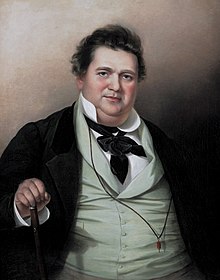Dixon Hall Lewis
| Dixon Hall Lewis | |
|---|---|
 |
|
|
United States Senator from Alabama |
|
|
In office April 22, 1844 – October 25, 1848 |
|
| Preceded by | William R. King |
| Succeeded by | Benjamin Fitzpatrick |
| Member of the U.S. House of Representatives from Alabama's at-large district |
|
|
In office March 4, 1841 – March 3, 1843 |
|
| Preceded by | none |
| Succeeded by | none |
| Member of the U.S. House of Representatives from Alabama's 4th district |
|
|
In office March 4, 1833 – March 3, 1841 |
|
| Preceded by | none |
| Succeeded by | none |
| Member of the U.S. House of Representatives from Alabama's 3rd district |
|
|
In office March 4, 1829 – March 4, 1833 |
|
| Preceded by | George Washington Owen |
| Succeeded by | Samuel Wright Mardis |
|
In office March 4, 1843 – April 22, 1844 |
|
| Preceded by | George Whitfield Crabb |
| Succeeded by | William Lowndes Yancey |
| Member of the Alabama House of Representatives | |
|
In office 1826-1828 |
|
| Personal details | |
| Born |
August 10, 1802 Dinwiddie County, Virginia |
| Died | October 25, 1848 (aged 46) New York, New York |
| Alma mater | South Carolina College |
Dixon Hall Lewis (August 10, 1802 – October 25, 1848) was an American politician who served as a Representative and a Senator from Alabama.
Lewis was born on Bothwick plantation, Dinwiddie County, Virginia, and moved to Hancock County, Georgia, with his parents in 1806. He graduated from Mount Zion Academy and from South Carolina College at Columbia in 1820. He moved to Autauga County, Alabama, the same year, where he studied law and was admitted to the bar in 1823. That same year he constructed a house ("Old Homestead") in the town of Lowndesboro, Alabama, twenty miles west of the state capitol in Montgomery. He began to practice law in Montgomery and was elected a member of the Alabama House of Representatives in 1826, serving until 1828. He was elected as a States Rights Democrat to the twenty-first and to the seven succeeding Congresses and served from March 4, 1829, to April 22, 1844, when he resigned the House to join the Senate. He served as chairman of the United States House Committee on Indian Affairs from 1831 to 1835. He was nearly elected Speaker of the House in the 26th Congress, receiving 113 votes on the 8th ballot, just four votes short of the necessary 117 needed to be elected. Robert M. T. Hunter was elected on the 11th ballot.
...
Wikipedia
